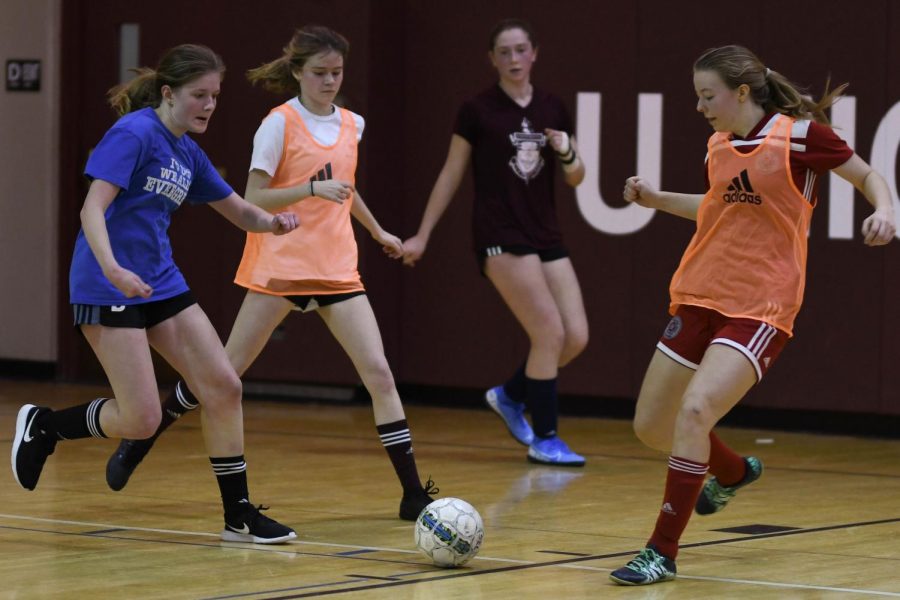Indoor athletics program facilitates bonds
Isabella Kellermeier
KICKIN’ IT. Running to the ball, Eleanor Skish, Sarah Brady and Zoe Stephens fight for the ball during a futsal game. During the season, two teams made up of five players a side play intrasquad games to develop skills and a closer team community. In accordance with IHSA rules, the winter program does not include any formal coaching and is both student-led and optional for team members.
February 20, 2020
Grunts and the sound of squeaking cleats fill the echoing gym of Lower Kovler. The soccer players on the court are laser-focused on one simple task: putting the ball into the opponent’s goal.
Futsal indoor soccer gives players on the boys and girls soccer teams an opportunity to stay sharp during the off season, and to get to know their teammates over a longer period of time than the season alone.
For the past three years, boys soccer players have spent the winter off-season developing their skills and integrating ninth graders into the team through an indoor soccer league. This year, the girls soccer team has created a similar winter intra-squad league in advance of their season.
“My favorite part about futsal is getting to know the new players and bonding as a team,” senior Liz Gately, defender, said. “It affects my play positively, moreso in relation to the whole team dynamic, because we get time to figure out how to play with each other before the season starts.”
Since the girls have their soccer season after months of futsal practices, it allows the older students to get to know the newer players better. This also gives the veterans a chance to show off their leadership skills, and to give development tips to less-experienced players, so they can be better equipped for the season.
The other interesting aspect: the futsal season is almost 100% student-organized. Futsal is set up by the coaches, but the teams are completely run by a select group of experienced players who take the initiative and organize the practices. The participation of the athletes comes from the students and isn’t mandatory, unlike scheduled practices during the season.
“Futsal is perfect for high school soccer players. The game of futsal develops technical skill and ability. In the tight spaces of the five-a-side game — five players against five players — technique matters,” boys head coach Josh Potter said.
During indoor practice, athletes split into groups of five, giving them more time with both their teammates and the ball. One problem is that players become more prone to injury.
“I think the only drawback of futsal is that it has led to a few injuries, which is less ideal with the season approaching so quickly,” Liz said.
As the off season nears its end, athletes now feel more prepared for the season and have stronger bonds with their teammates.




























































